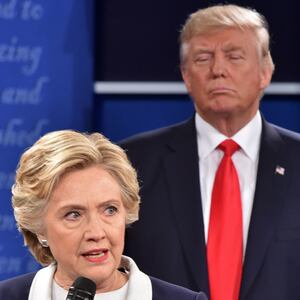Has President Donald Trump just tipped the scales in favor of concluding that he has obstructed justice?
Recent reporting by The New York Times and CNN that Trump sought to direct the Department of Justice to prosecute Hillary Clinton and James Comey is an alarming violation of presidential norms, and it may also cross the line into illegal conduct.
While a directive by a president to prosecute a political rival like Clinton is highly unusual and inappropriate, it is the order relating to Comey that is most likely to amount to criminal behavior.
The president, as head of the executive branch, leads the Department of Justice and all other components of the executive branch. As such, the law does not prohibit him from suggesting or even directing DOJ to use its resources to investigate a potential crime.
To avoid the appearance of partisanship in the use of this power, however, norms have emerged in which DOJ and the White House discuss cases only at a high level, usually relating to policy decisions and priorities as opposed to charges in individual cases. Instead, the attorney general is entrusted to exercise his duties with independence, free from political interference by the president. This independence is important to ensure the reality and the perception that case decisions are made based on facts and evidence, and not on political considerations.
Directing DOJ to investigate Clinton for possible criminal conduct violates these norms by involving the president in a particular case. It becomes especially jarring when the target of such an investigation is the candidate who opposed the president in the election that put in him office.
But this problem is compounded when it comes to Comey. In addition to creating the appearance that charges are being sought to even the political score for Trump, prosecuting the former FBI director could also be motivated by a desire to discredit him as a witness in Special Counsel Robert Mueller’s investigation into links between the Trump campaign and Russia to interfere in the 2016 presidential election. If so, this directive to prosecute Comey could be evidence of obstruction of justice by Trump.
Obstruction of justice occurs when someone acts with a corrupt intent to interfere with an official proceeding, such as a grand jury investigation. An essential element of obstruction of justice is the person’s intent to act “corruptly.” Jurors are instructed that because we cannot read another person’s mind, we must instead look to the totality of the circumstances of what the person said and did to draw reasonable inferences about his intent. While one act alone may not be enough to cause a fact finder to conclude that a person acted corruptly, a pattern of activity can sometimes make corrupt intent unmistakable.
Some evidence of obstruction by Trump is already in the public record. First, Comey has alleged that one week after being sworn in as president, when he was serving as FBI director, Trump asked him to pledge his loyalty. In his role as FBI Director, Comey had recently briefed Trump on the Russia investigation. Was Trump hoping for an alliance with Comey so that he could ask Comey to interfere with or even shut down investigation?
Second, Comey has alleged that Trump asked him to drop the investigation into Michael Flynn, who was then serving as the National Security Advisor. Flynn was ultimately charged with making false statements regarding conversations he had with Russian officials, pleaded guilty and agreed to cooperate by providing substantial assistance in the investigation of others. Was this the very outcome that Trump was seeking to avoid when he made the alleged request to Comey?
Third, when Comey appeared to defy Trump’s requests, Trump fired him as FBI director. Was that an additional effort to change the direction of the FBI’s investigation? Or a warning shot to anyone who refused to pledge loyalty to Trump?
Then there is the replacement of Attorney General Jeff Sessions, who recused himself from the Russia investigation because of his role on the Trump campaign. Trump repeatedly complained about Sessions’s recusal and failure to “protect” him. When Trump fired Sessions, instead of following the Attorney General Succession Act, and replacing Sessions with Deputy Attorney General Rod Rosenstein, Trump leapfrogged Rosenstein with Matthew Whitaker, Sessions’ then-chief of staff. The appointment of Whitaker has been challenged as violating statutory and constitutional law, but it also raises a fair inference that the appointment was motivated by something other than qualifications, experience or vision for the job. Whitaker has written and spoken publicly against the Russia investigation. Did Trump install him as acting attorney general to interfere with the investigation?
Any one of these facts, standing alone, may not be enough to lead reasonable people to conclude that Trump has been acting with a corrupt intent to interfere with the Mueller investigation, and now we have an additional significant fact to add to the pile – Trump’s directive to prosecute Comey and discredit him as a witness. At some point, the pile of evidence becomes a mountain, making an inference of corrupt intent irrefutable.
Of course, it seems unlikely that Trump, as a sitting president, would be indicted for any crime, in light of DOJ policy to the contrary, but attempting to obstruct justice could constitute a high crime or misdemeanor sufficient to trigger impeachment.







